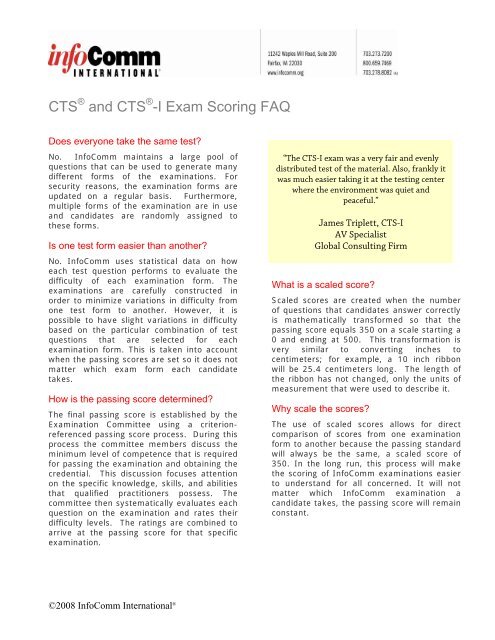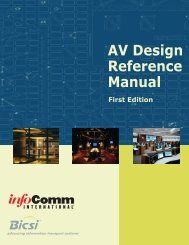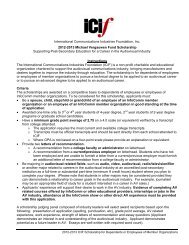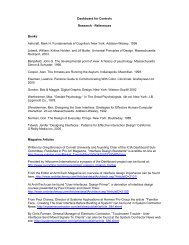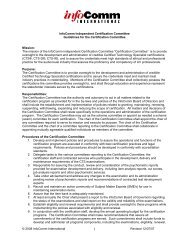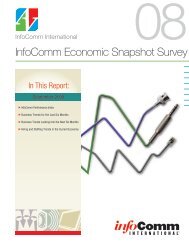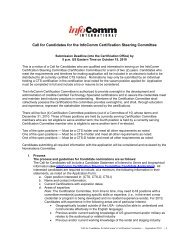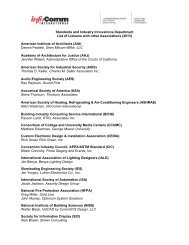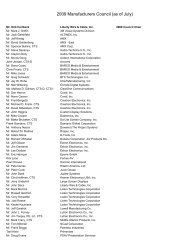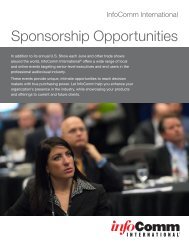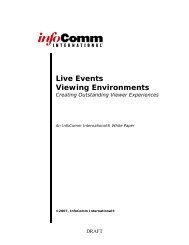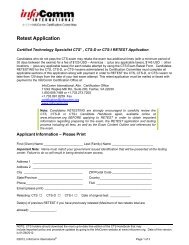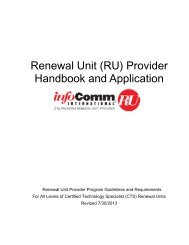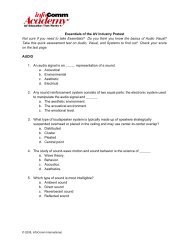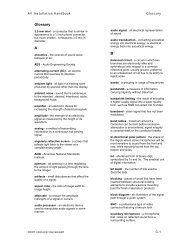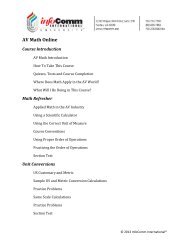Scaled Score FAQs: - InfoComm
Scaled Score FAQs: - InfoComm
Scaled Score FAQs: - InfoComm
Create successful ePaper yourself
Turn your PDF publications into a flip-book with our unique Google optimized e-Paper software.
CTS ® and CTS ® -I Exam Scoring FAQ<br />
Does everyone take the same test?<br />
No. <strong>InfoComm</strong> maintains a large pool of<br />
questions that can be used to generate many<br />
different forms of the examinations. For<br />
security reasons, the examination forms are<br />
updated on a regular basis. Furthermore,<br />
multiple forms of the examination are in use<br />
and candidates are randomly assigned to<br />
these forms.<br />
Is one test form easier than another?<br />
No. <strong>InfoComm</strong> uses statistical data on how<br />
each test question performs to evaluate the<br />
difficulty of each examination form. The<br />
examinations are carefully constructed in<br />
order to minimize variations in difficulty from<br />
one test form to another. However, it is<br />
possible to have slight variations in difficulty<br />
based on the particular combination of test<br />
questions that are selected for each<br />
examination form. This is taken into account<br />
when the passing scores are set so it does not<br />
matter which exam form each candidate<br />
takes.<br />
How is the passing score determined?<br />
The final passing score is established by the<br />
Examination Committee using a criterionreferenced<br />
passing score process. During this<br />
process the committee members discuss the<br />
minimum level of competence that is required<br />
for passing the examination and obtaining the<br />
credential. This discussion focuses attention<br />
on the specific knowledge, skills, and abilities<br />
that qualified practitioners possess. The<br />
committee then systematically evaluates each<br />
question on the examination and rates their<br />
difficulty levels. The ratings are combined to<br />
arrive at the passing score for that specific<br />
examination.<br />
“The CTS-I exam was a very fair and evenly<br />
distributed test of the material. Also, frankly it<br />
was much easier taking it at the testing center<br />
where the environment was quiet and<br />
peaceful.”<br />
James Triplett, CTS-I<br />
AV Specialist<br />
Global Consulting Firm<br />
What is a scaled score?<br />
<strong>Scaled</strong> scores are created when the number<br />
of questions that candidates answer correctly<br />
is mathematically transformed so that the<br />
passing score equals 350 on a scale starting a<br />
0 and ending at 500. This transformation is<br />
very similar to converting inches to<br />
centimeters; for example, a 10 inch ribbon<br />
will be 25.4 centimeters long. The length of<br />
the ribbon has not changed, only the units of<br />
measurement that were used to describe it.<br />
Why scale the scores?<br />
The use of scaled scores allows for direct<br />
comparison of scores from one examination<br />
form to another because the passing standard<br />
will always be the same, a scaled score of<br />
350. In the long run, this process will make<br />
the scoring of <strong>InfoComm</strong> examinations easier<br />
to understand for all concerned. It will not<br />
matter which <strong>InfoComm</strong> examination a<br />
candidate takes, the passing score will remain<br />
constant.<br />
©2008 <strong>InfoComm</strong> International ®
Why is the scale 0 to 500 when I didn’t see<br />
500 questions?<br />
The scale used by <strong>InfoComm</strong> is similar to<br />
scales used by other large testing programs,<br />
such as the SAT, ACT, or GRE. The scale has<br />
more points on it than there are questions on<br />
the examination.<br />
Does scaling the scores affect who passes<br />
or fails an exam?<br />
No. The use of scaled scores does not affect<br />
whether or not an individual candidate passes<br />
or fails the examination. The pass/fail decision<br />
is always made by comparing the number of<br />
questions answered correctly to the passing<br />
score that was established using the criterion<br />
referenced process. All candidates who<br />
correctly answer more items than are required<br />
to pass the examination form that they took<br />
will obtain scaled scores that are between 350<br />
and 500. Candidates who did not answer<br />
enough items to pass will obtain scaled scores<br />
between 0 and 349.<br />
Can I find out how many questions<br />
I answered correctly?<br />
<strong>InfoComm</strong> will not report the number of<br />
questions answered correctly or the overall<br />
percentage of questions answered correctly.<br />
However, candidates will be provided with the<br />
percentage of questions answered correctly for<br />
each section of the examination to help failing<br />
candidates target areas for further study. It is<br />
important to note that, because the number of<br />
questions contained within each section of the<br />
examination varies, adding or averaging the<br />
percentage correct scores will not be an<br />
accurate reflection of your overall examination<br />
score.<br />
Find out more about <strong>InfoComm</strong> AV Certification:<br />
certification@infocomm.org<br />
or call us at 1.800.659.7469 (+1.703.273.7200 outside the U.S.)<br />
www.infocomm.org/cts<br />
Certification is not a guarantee for performance by certified individuals. Certified Technology Specialists (CTSs) at all levels of certification have demonstrated audiovisual knowledge<br />
and/or skills. Certified individuals adhere to the CTS Code of Ethics and Conduct and maintain their status through continued education. Certification demonstrates commitment to<br />
professional growth in the audiovisual industry and is strongly supported by <strong>InfoComm</strong>. All eligibility, application, score reports, special accommodation requests and general inquiries<br />
regarding <strong>InfoComm</strong> certification will be handled through the <strong>InfoComm</strong> International Certification Office, with headquarters located in Fairfax, Virginia., U.S.A. Purchases of education,<br />
membership, or any other <strong>InfoComm</strong> services are not required to seek certification<br />
©2008 <strong>InfoComm</strong> International ®


